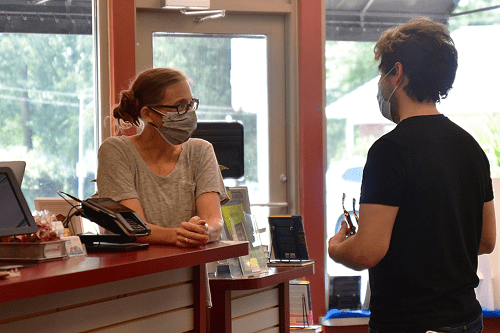
9.1.21 – KCUR | By Jacob Martin | Shawnee Mission Post.—
A new survey of more than 180 members of the Greater Kansas City Area Chamber of Commerce showed that more than 80% of local businesses and organizations are so far not requiring workers be vaccinated, though nearly 80% are requiring masks be worn on their premises.
A survey of Kansas City-area businesses shows more than 8 out of 10 places are so far not requiring their employees to be vaccinated, but nearly the same proportion say they are requiring mask-wearing and doing other things to mitigate the spread of COVID-19.
The Greater Kansas City Chamber of Commerce held a virtual meeting Tuesday with some of its members to discuss issues surrounding what businesses can do to keep their workforce safe and keep themselves open amid the recent surge of the Delta variant.
The meeting aimed to provide local business owners with resources to increase vaccination rates in the workplace, answer legal questions regarding vaccinations and provide feedback from other businesses.
The Chamber also unveiled results from a survey taken by 184 metro businesses, nonprofits and municipal governments about steps they were taken to try to control the spread of COVID-19.
“As business owners and employers we all want to keep our workforce healthy and keep our doors open especially our small business owners. Vaccines will help us do that,” Joe Reardon, President, and CEO of KC Chamber said. “We know that everyone has questions and opinions surrounding the vaccines but we also know getting vaccinated is the best way to stop the spread of the Delta Variant.”
Key findings
Here are some key findings from the KC Chamber’s survey:
- 85% of businesses surveyed said they are not requiring vaccinations for employees currently
- 78% of businesses said they are requiring mask-wearing and other protocols in the workplace as a preventative measure
- 34% said they are incentivizing vaccinations for employees in some form, such as giving cash bonuses or increases in PTO
- 31% of businesses have travel restrictions in place for employees
- 20% of employers are not allowing visitors into their workplace
- 44% of employers have changed their return-to-office policy due to the Delta variant
Reasons for not mandating vaccines
Businesses were also asked what is preventing their efforts in requiring vaccinations for their workforce.
The answers varied widely but some companies said they were already seeing high vaccination rates among their employees.
Others expressed fear that mandating vaccines could hurt moral or company culture or lead to an exodus of workers at a time when it’s already a struggle to recruit.
Some said they feared vaccine mandates might lead to lawsuits, and others emphasized that it was workers’ personal choice.
Still, some businesses said they were still assessing the ongoing pandemic and did not eliminate the possibility of using vaccine mandates in the future.
Federal guidance
For now, the highest profile organizations mandating vaccines in the metro have been hospitals.
On Wednesday, KU Health System became the third major local hospital network— after St. Luke’s and Truman Medical Centers — to require workers be vaccinated.
The Chamber at its Tuesday meeting also brought together a panel of experts to help answer questions regarding vaccinations in the workplace.
Kansas does not prohibit private employees from issuing a vaccine mandate, the Chamber said.
The state follows federal OSHA guidelines that allow businesses to adopt vaccination policies for employees following a revision earlier this month.
That new guidance says, “OSHA suggests that employers consider adopting policies that require workers to get vaccinated or to undergo regular COVID-19 testing – in addition to mask-wearing and physical distancing – if they remain unvaccinated.”
The Chamber emphasized that businesses and organizations have alternatives to requiring vaccines, if they do not feel comfortable mandating employees get the shots.
Companies may be able to offer incentives, like:
- weekly drawing for vaccinated employees,
- discounted rates on insurance
- additional PTO for vaccinated workers
- or extra vacation days for vaccinated employees.
Companies have also started to dis-incentivize not being vaccinated. Delta Airlines, for instance, announced it will raise health insurance premiums for unvaccinated employees, similar to surcharges often assessed for employees who smoke.
This story was originally published on the Shawnee Mission Post.
